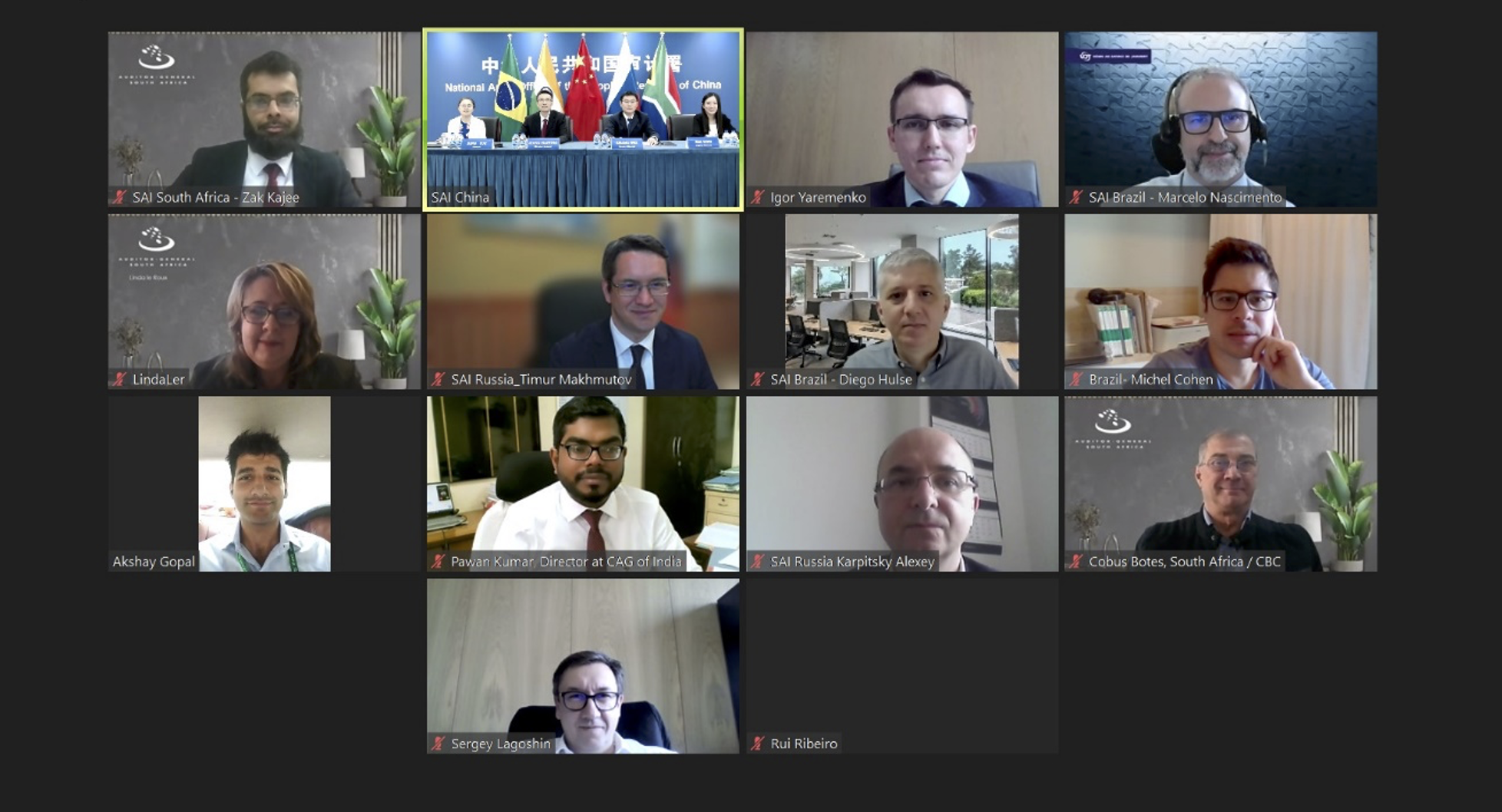
Real-Time Audit: BRICS SAIs’ experience
On 22 May 2023, BRICS supreme audit institutions (SAIs) via videoconference held a seminar on real-time audit.
Opening the seminar, Mr. Jiang Haiying, Director General of the Department of International Cooperation of the National Audit Office of the People's Republic of China, stated that real-time audit creates new opportunities for developing BRICS economies: SAIs can detect infringements as they are committed. In addition, auditors can now make recommendations to audited entities in a shorter period of time.
Brazil’s Federal Court of Accounts is actively incorporating new technologies into its audits and is committed to using them to monitor non-compliance. Mr. Diego Rodrigues Hulse, Head of the Audit Division for Personnel of the Federal Court of Accounts, outlined the features of real-time payroll audits. The speaker highlighted the benefits of continuous auditing in this area, including the ability to detect major irregularities through data-driven intelligence and verify monthly payments in a timely manner. Another advantage of these audits is their low cost. At the same time, issues arise in terms of the quality of data used, the scope of inspections, and impossibility to remedy violations as quickly as they are detected.
SAI Brazil also conducts continuous audits of IT procurement. Mr. Marcelo Nascimento Barbosa, Head of the Audit Division for IT Management Assessment, noted that the SAI applies both the latest and traditional audit tools in these activities. Auditors are integrating artificial intelligence instruments into checks. For example, the ALICE system analyses tender information published by federal agencies and detects irregularities.
As the Russian budget is programme-based, auditors have to regularly analyse and evaluate not only the use of resources, but also the performance of various programmes and projects. Mr. Igor Yaremenko, Head of Inspection for Development of the Methodology of Audit of Programmes and Projects of the Research and Methodology Department of the Accounts Chamber of the Russian Federation, spoke about real-time audit of programmes and projects in Russia. It is based on information from government information systems and their subsystems, such as the “Electronic Budget” system. So far, audits of programmes and projects are carried out on a monthly basis. Particular attention is paid to the credibility, accuracy and completeness of data from information systems, including those compiled by specific agencies. The audit of programmes and projects does not substitute the monitoring by the agencies themselves, as the Accounts Chamber develops extended, additional evaluation parameters and compiles a separate, independent database. This helps to obtain a complete picture of programmes and projects implementation and, if necessary, to plan the on-site inspections.
Real-time audit creates both major opportunities and new risks for SAIs. Mr. Pawan Kumar, Director in the Office of the Director General of Audit (Energy), and Mr. Akshay Gopal, Deputy Director in the Office of the Director General of Audit (Energy) elaborated on the main risks and benefits of real-time auditing for SAI India. Speakers mentioned that real-time audits increase the transparency and accountability of government and reduce the risk of corruption and fraud. However, conducting such audits requires advanced knowledge of new technologies, greater focus on data quality, and special attention to confidentiality. The speakers concluded that these challenges could be addressed through a comprehensive approach that includes ramping up investments in technology development, building data management practices and enhancing professional skills of staff.
Mr. Zhang Wei, Deputy Director of the Department of Social Security Audit of the National Audit Office of the People’s Republic of China, analysed the characteristics of real-time audits of government-subsidised housing projects. These audits focus in particular on compliance with quality standards and construction deadlines. Analysis of housing allocation data and its comparison with data from other sources help to determine whether public housing is provided to those who really need it. Also continuous assessment of regulatory compliance enables auditors to identify cases of overpricing and imposing unauthorised fees.
Ms Linda le Roux, Leader of the Reporting and Methodology Business Unit, and Mr. Zakaria Kajee, Deputy Leader of the Reporting and Methodology Business Unit, shared their vision of real-time audits at the Auditor General of South Africa. The speakers noted the difficulties encountered in auditing the flood relief and COVID-19-related support measures, including the tight schedule of the audits. The audit office implemented suitable measures such as early and detailed audit planning to mitigate risks identified. At the same time, the use of multidisciplinary audit teams and elevated leadership involvement contributed to obtaining meaningful audit results. The audits also proved the advantages of real-time data analysis and access to auditee information. SAI South Africa is planning to further expand its own technological capabilities.
Summing up the results of the seminar, the participants mentioned that real-time auditing is an important aspect in the development of the activities of the BRICS SAIs and expressed hope for fruitful discussions at future seminars.



